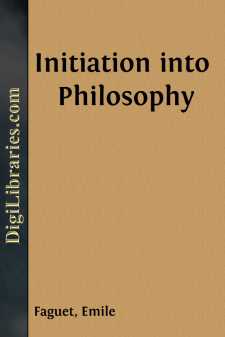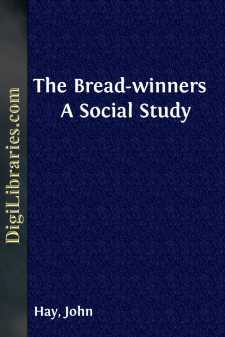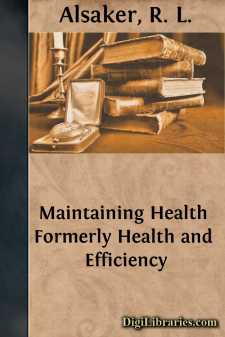Fiction
- Action & Adventure 180
- Biographical 15
- Christian 59
- Classics
- Coming of Age 5
- Contemporary Women 3
- Erotica 8
- Espionage/Intrigue 12
- Fairy Tales, Folklore & Mythology 236
- Family Life 169
- Fantasy 117
- Gay 1
- General 596
- Ghost 32
- Historical 808
- Horror 43
- Humorous 160
- Jewish 25
- Legal 4
- Medical 22
- Mystery & Detective 315
- Political 49
- Psychological 41
- Religious 64
- Romance 159
- Sagas 11
- Science Fiction 730
- Sea Stories 113
- Short Stories (single author) 537
- Sports 10
- Suspense 1
- Technological 8
- Thrillers 2
- Urban Life 31
- Visionary & Metaphysical 1
- War & Military 173
- Westerns 199
Classics Books
Sort by:
by:
Emile Faguet
CHAPTER I BEFORE SOCRATES Philosophical Interpreters of the Universe, of the Creation and Constitution of the World. PHILOSOPHY.—The aim of philosophy is to seek the explanation of all things: the quest is for the first causes of everything, and also how all things are, and finally why, with what design, with a view to what, things are. That is why, taking "principle" in all the senses of the...
more...
by:
John Fox
THE cave had been their hiding-place as children; it was a secret refuge now against hunger or darkness when they were hunting in the woods. The primitive meal was finished; ashes were raked over the red coals; the slice of bacon and the little bag of meal were hung high against the rock wall; and the two stepped from the cavern into a thicket of rhododendrons. Parting the bushes toward the dim light,...
more...
by:
Terry A. Vaughan
The first specimens of Myotis velifer from California were taken in 1909 by C. L. Camp at Needles, San Bernardino County (Grinnell, Univ. California Publ. Zool., 12:266, March 20, 1914), and subsequently this bat was recorded from farther south in the lower Colorado River Valley at the Riverside Mountains, Riverside County (Stager, Jour. Mamm., 20:226, May 14, 1939). West of the Rocky Mountains the...
more...
by:
Rudyard Kipling
THE GOD FROM THE MACHINE Hit a man an' help a woman, an' ye can't be far wrong anyways.— Maxims of Private Mulvaney. The Inexpressibles gave a ball. They borrowed a seven-pounder from the Gunners, and wreathed it with laurels, and made the dancing-floor plate-glass, and provided a supper, the like of which had never been eaten before, and set two sentries at the door of the room to...
more...
by:
Helen Zimmern
CHAPTER I. INTRODUCTORY. Too many memoirs begin with tradition; to trace a subject ab ovo seems to have a fatal attraction for the human mind. It is not needful to retrace so far in speaking of Miss Edgeworth; but, for a right understanding of her life and social position, it is necessary to say some words about her ancestry. Of her family and descent she might well be proud, if ancestry alone, apart...
more...
by:
John Hay
I. A MORNING CALL A French clock on the mantel-piece, framed of brass and crystal, which betrayed its inner structure as the transparent sides of some insects betray their vital processes, struck ten with the mellow and lingering clangor of a distant cathedral bell. A gentleman, who was seated in front of the fire reading a newspaper, looked up at the clock to see what hour it was, to save himself the...
more...
CHAPTER I. WHAT LUCK DID FOR THE CHUMS. "It was a long trip, fellows, but we're here at last, thank goodness!" "Yes, away up in the North Woods, at the hunting lodge of Trapper Jim!" "Say, it's hard to believe, and that's a fact. What do you say about it, you old stutterer, Toby Jucklin?" "B-b-bully!" exploded the boy, whose broad shoulders, encased in a...
more...
by:
V. V. Vide
CHAPTER I. BIRTH AND EARLY LIFE OF TECUICHPO.Tell me, ascribest thou influence to the stars? “Wo! wo! wo! to the imperial House of Tenochtitlan! Never saw I the heavens in so inauspicious an aspect. Dark portentous influences appear on every side. May the horoscope of the infant daughter of Montezuma never be fulfilled.” These were the awful words of the priestly astrologer of Tenochtitlan, uttered...
more...
by:
R. L. Alsaker
CHAPTER I. PRELIMINARY CONSIDERATIONS. Writings on hygiene and health have been accessible for centuries, but never before have books and magazines on these subjects been as numerous as they are today. Most of the information is so general, vague and indefinite that only a few have the time and patience to read the thousands of pages necessary to learn what to do to keep well. The truth is to be found...
more...
CHAPTER I. MY FIRST SEANCE, AND WHAT CAME OF IT. Not being acquainted with any "materializing medium," so termed, I obtained from Mr. Luther Colby, of Boston, a letter of introduction to Mrs. H. B. Fay, of that city, stating that I was desirous of visiting her seances. I called upon the lady and presented the letter, but found that she was out of health, and, for the present, had discontinued...
more...











